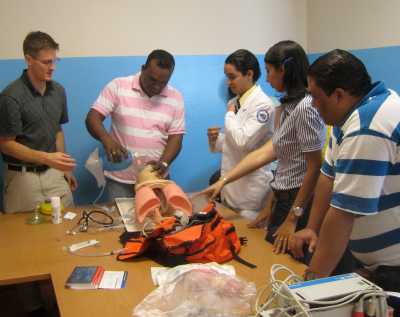|
|
We all know the saying, “Give a man a fish, and he’ll eat for a day; teach a man to fish, and he’ll never go hungry.” Debra Heitmann, MD, clinical associate professor of emergency medicine, is one of many UMass Medical School faculty who try to live the proverb. Dr. Heitmann and colleagues from the Department of Emergency Medicine have been teaching Advanced Cardiac Life Support (ACLS) to health care providers in the Dominican Republic (DR) as part of their efforts to establish a self-sustaining training program that meets international standards.
The American Heart Association recognizes countries that are approved as teaching sites for ACLS, but the DR was not one of those countries. The mission? “To educate the caregivers, train the trainers and create a program that meets the AHA guidelines but is also realistic and sustainable in the DR,” Heitmann said. In short, to “teach a man to fish.”
Since 2002, teams of clinicians, nurses and paramedics have taught ALCS to more than 500 people in six cities in the DR in annual weeklong visits supported by the Rotary International Society. The program was started by GEMINI (Global Emergency Medicine Initiative), a collaboration with the Rotary that seeks to improve the quality of emergency medicine in developing countries around the world.
Heitmann’s work with the GEMINI project has evolved through the years; she originally joined the team as a volunteer educator and now serves as medical director and education director. She has traveled to the DR eight times with other UMMS faculty and students, and clinicians from UMass Memorial Health Care and elsewhere across the country. Usually 10 to 12 people participate in each trip, including several Rotarian ambassadors who foster relationships with the Dominican organizations through which the program operates.
In the earlier years of the program, Heitmann and colleagues encountered gaps in knowledge, such as an inability to recognize various cardiac rhythms. Faculty would ask, “Is this a shockable or nonshockable rhythm? Students often couldn’t identify the difference—or how to treat the two different conditions—so we taught an extra module, and it has had a tremendous impact on learning,” she said. Tailoring the program to the needs of the learners, and to the resources they have available to them, has been important.
Each of the two-day courses, taught in different regions during each visit, enroll roughly 30 to 45 students, who are eager to gain the knowledge and training. “We’ve had learners travel two or three hours by bus, each way, just to get this training.” Each learner, Heitmann noted, comes to the training with a different perspective and takes away from it valuable tools that he or she can apply, regardless of the type of clinical setting. Heitmann stressed the importance of seeing medicine in context. She values the opportunity to tour hospitals in different regions of the country and to understand what resources and training are needed, and how that impacts the medical professionals’ ability to provide optimal care.
“There’s a huge variation in the care available. Clinical settings range from state-of-the-art hospitals in the major cities to the poorest-of-the-poor makeshift spaces,” she said. “But even in centers that are fairly well equipped, sometimes the equipment isn’t used properly, or at all, because personnel don’t know how to use it, or it’s not maintained. So we’ll ask, for example, ‘Does this hospital have a defibrillator? Where is it kept? Do people know how to use it? Is there ample power to keep it charged? Does it work?’ Anyone can donate a defibrillator, but if people don’t know how to use it or they can’t charge it, then it’s wasted.”
“I’m happy because the students are increasingly successful—the number who pass the exams and obtain certification is skyrocketing, and it gets better with each trip.”
A location in Santo Domingo, the country’s capital, has recently become an authorized AHA training center. Heitmann expects that, through their collaborative efforts, a second site will be developed in LaVega, another major city to the northwest.
Instructors who traveled to the DR in late October included Heitmann and UMass Memorial colleagues Rosemary Cerqueira MSN, ANP; Michelle Harwick, DNP, ACNP; and Jonathan McCall, MD; along with colleagues from GEMINI and other institutions, Timothy Redding, NREMT-P, I/C; Eric Goedecke DO, and Felipe Rodriguez, MD.
